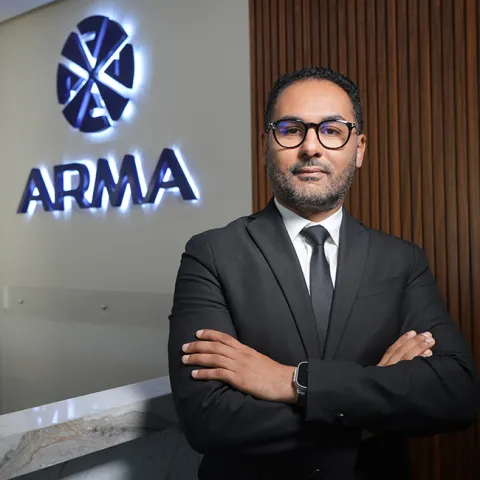Share the page
Casablanca: a revolution in connected waste with Arma
Published on
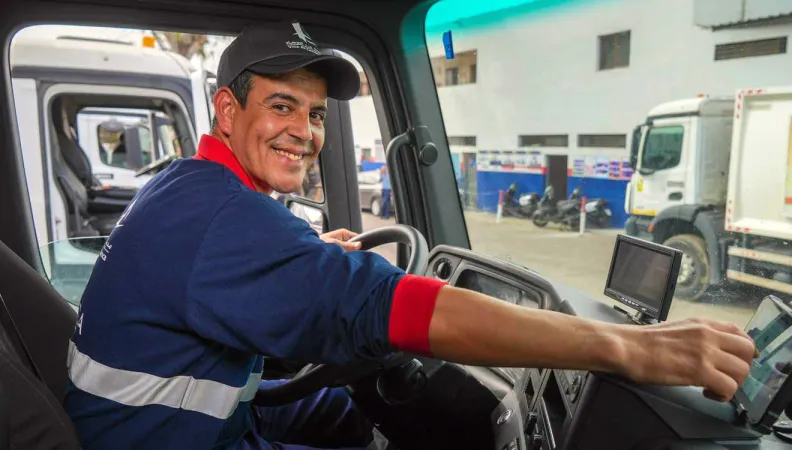
In the heart of Casablanca, urban waste management operator Arma is reinventing waste collection using leading-edge technology and a virtuous development model. Focus on a business that goes beyond logistics to tackle the social and environmental challenges of major urban centres in the 21st century.
In the maze of Casablanca’s streets and its three million inhabitants, Arma's trucks are putting the finishing touches to their daily routine. These cleaning behemoths criss-cross the nine districts of Ville Blanche, North Africa’s most populous neighbourhood, covering nearly 23,000 kilometres a day, on their mission to collect the 430,000 tonnes of waste generated each year by the 1.5 million people served by Arma's operations.
As Yasmina Ahizoune, Arma's Deputy Managing Director explains, “Casablanca has some very specific features.” With its high urban density and heavy traffic, ‘Casa’ imposes certain exceptional logistical constraints. These are compounded by an overriding objective: optimising the efficiency of each collection round while reducing environmental pollution. Yasmina Ahizoune adds that, to meet these needs, “we are now relying heavily on digital technology. We have fitted our trucks with smart devices and sensors to streamline our activity and provide better information about our carbon footprint. This equipment also provides our customer, the City of Casablanca, with total visibility over our service performance.”
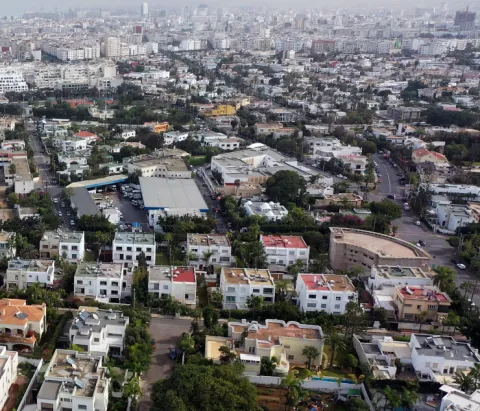
A multi-faceted partnership with Proparco
To meet these challenges, in 2019, Arma entered into a partnership with Proparco, Agence Française de Développement’s private sector arm. Proparco is working with Moroccan bank BMCI Leasing to provide a €15 million guarantee to finance a large part of the investment made under the waste management contract signed with the City of Casablanca.
As Alaaeddine Bentbib, Arma Group Administrative and Financial Officer points out, “These investments were essential for upgrading our infrastructure. They are part of our public service concession with the City of Casablanca, which is worth around 400 million dirhams [€38.5 million]. This is the biggest waste management contract in Morocco, and one of the biggest in Africa.” Alaaeddine Bentbib stresses that waste collection management in Casablanca is a complex and costly undertaking, requiring the joint mobilisation of public authorities and the private sector "with a common goal": Improving the public service.”
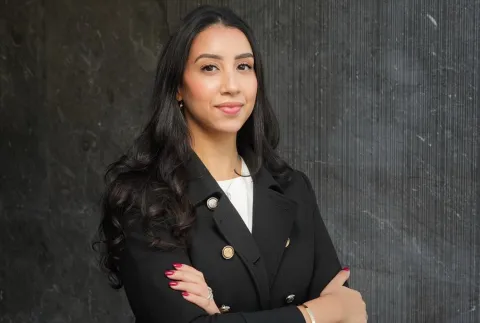
But the partnership between the two entities is not limited to financial support. Proparco is also partnering Arma in a continuous improvement process, based around regular audits of environmental and social indicators. Yasmina Ahizoune goes on to explain that, “These audits encourage us to constantly raise our standards at a time when local authorities have growing expectations in terms of sustainability. We have been encouraged to adapt our practices and improve our standards.” The young executive adds that another advantage has emerged thanks to Proparco's support: “Our partnership also serves to reassure the banks.”
French, Moroccan and European partners at the heart of the Arma adventure
To tackle its public interest mission in Casablanca, Arma has selected France-based Simpliciti and the Moroccan company Velovolt to digitise its operations, using innovative operational monitoring software and installing GPS/RFID tags on its vehicles, equipment and containers.
Simpliciti (formerly known as Sabatier Géolocalisation) is a French information technology and systems designer focused on the challenges of Smart Cities. It was set up in 1994 and now has around 100 employees and more than 1,600 customers in Europe and Africa.
Waste management also involves universal products that are well known to municipalities the world over, namely bins and containers. Arma has purchased virtually all of its bins from Contenur, a French-based company and world leader in the design, manufacture and marketing of comprehensive urban waste container solutions. Contenur is nearly 30 years old and is present in more than 40 countries around the world.
At European level, we should also note that Arma maintains a special relationship with the German company Mercedes-Benz Trucks, which supplies the chassis for its trucks.
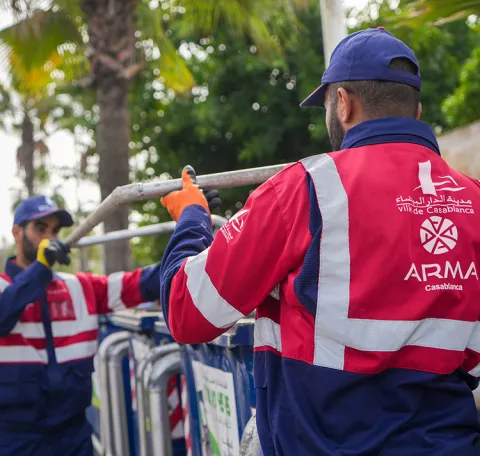
A technological shift
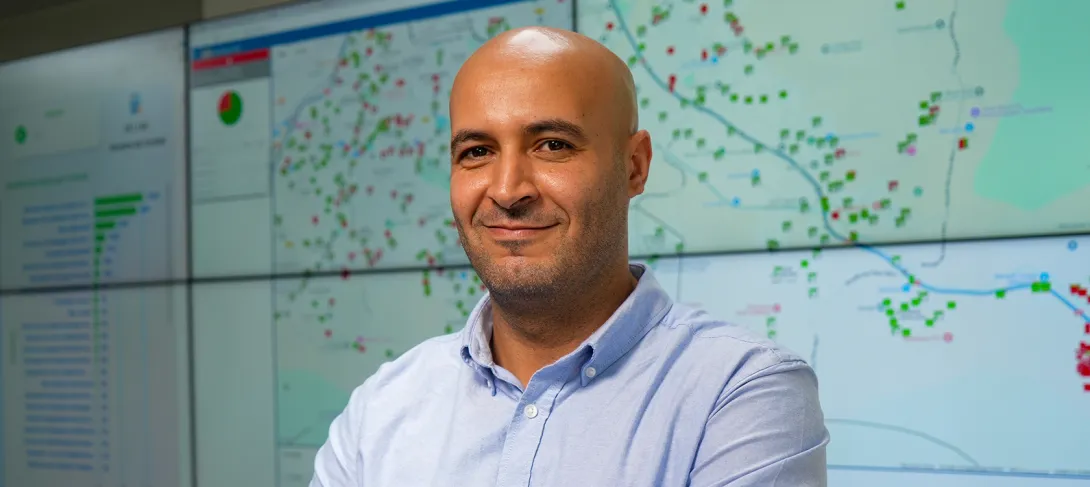
In this context, innovation plays a crucial role. In 2019, Arma introduced a connected waste collection management system. As Dakie Miri, Director of Arma's Operational Control Centre explains, “On the one hand, we have the 'hardware'. This comprises the GPS systems installed in all our trucks criss-crossing the streets of Casablanca. Some GPS systems are also fitted on the trolleys of the cleaning agents who manually sweep the streets. And then there is the ‘software’ component: the data collected by these GPS systems. Here, at Operational Control Centre, we store and analyse this data to adjust certain collection routes, in order to achieve maximum service delivery efficiency.”
An innovative system with a dual purpose: “This system allows us to analyse the data collected in real time to adjust routes and reduce unnecessary journeys. The objective is maximum efficiency, while minimizing carbon footprint and pollution.”
Moreover, 80% of collections previously made mainly during the day now take place at night. This strategy, adopted to limit traffic disruption, has required citizens to change their habits – they now have to take out their waste at specific times.
An eco-responsible approach
Respect for the environment “is embedded in the Group's DNA”, stresses Yasmina Ahizoune. Its investments in vehicles equipped with technologies that limit noise pollution and CO² emissions are a good illustration of this.
Arma's Deputy Managing Director adds that, “Nowadays, we cannot dissociate waste collection from an environmentally friendly approach.”
Aside from technology, Arma places people at the heart of its action. Continuous employee training covers a variety of domains, ranging from road safety to CSR issues.
The Company also has a marked commitment to inclusion and nearly 6% of employees in Casablanca have a disability contract.
Yasmina Ahizoune adds that “In terms of gender equality, we are doing our utmost to encourage female staff to join the ranks of administrative employees and managers in jobs that have historically been male dominated.”
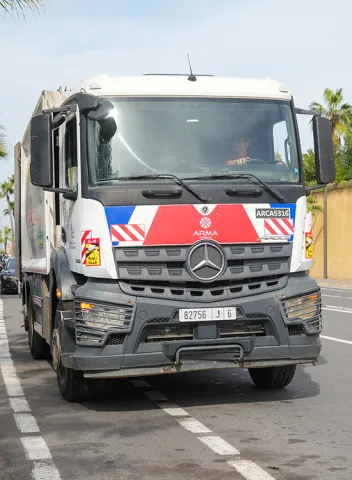
Tomorrow – and artificial intelligence
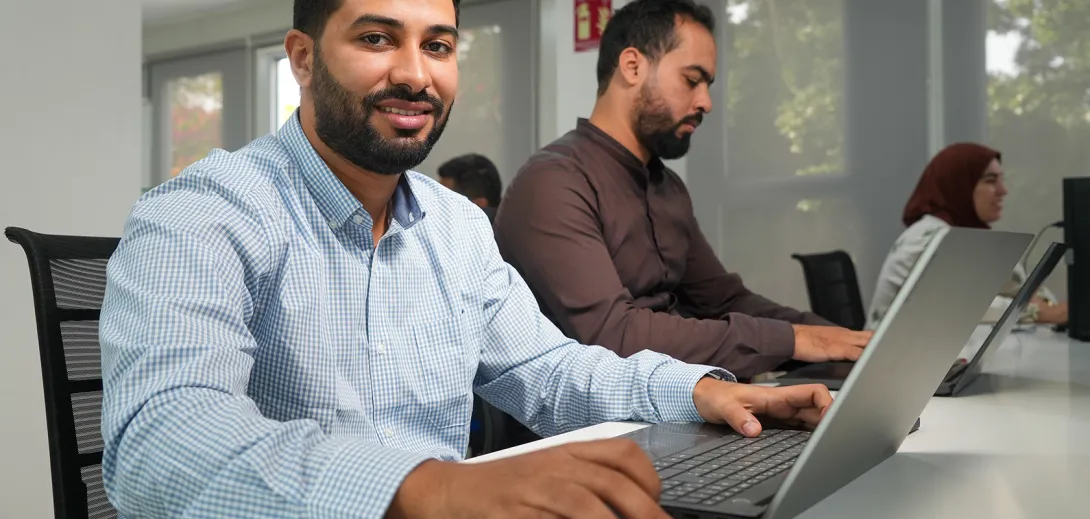
Although Arma's contract with the city of Casablanca ends in 2026, the Company is already looking to the future – and, as always, to innovation. The volumes of data collected should soon be processed by artificial intelligence algorithms, allowing for greater route optimisation. Dakie Miri points out that “Because we produce massive amounts of data, powerful algorithms are needed, for example, to recalculate an optimal collection route automatically and very quickly.”
Yasmina Ahizoune explains one way that Arma is continuing its well-established tradition of innovation: “We are the only company to use this digital waste management processing software here in Morocco and, to my knowledge, the only one in Africa with a near real-time management system. Our goal is to make Casablanca a model for Africa.” A goal that could transform waste management in Morocco beyond the streets of Casablanca, while inspiring other cities on the continent.
The advantages of leasing
The partnership between Arma, Proparco and Moroccan bank BMCI Leasing has enabled Arma to lease its rolling stock instead of having to buy it. The arrangement is based on the same principle as the leasing contracts available to individuals when they lease vehicles for a long period, with an option to purchase at the end of the contract. Alaaeddine Bentbib, Arma's Administrative and Financial Director, believes that leasing has three major advantages for the Group:
- Tax advantages: “Because Arma is a service provider, we are able to recover VAT very easily via the invoices issued by the lessor.”
- Attractive purchase option: “We get to buy the equipment back for a tiny residual value at the end of the lease.”
- Low initial cost: “This financing arrangement eases the company's cash flow position at the time of investment.”
